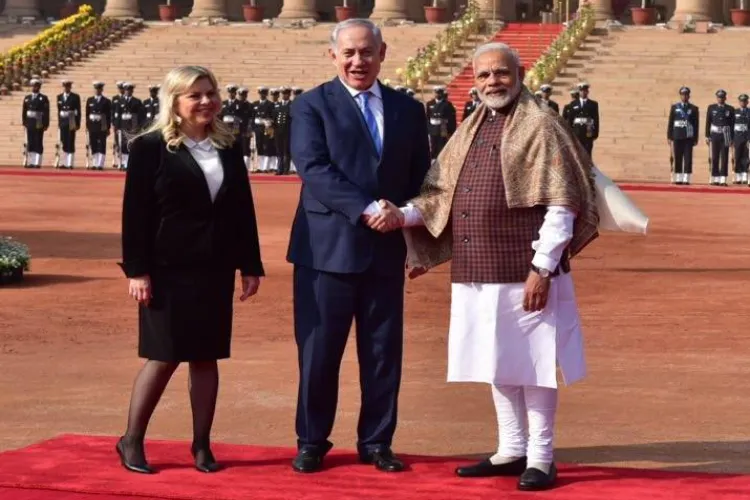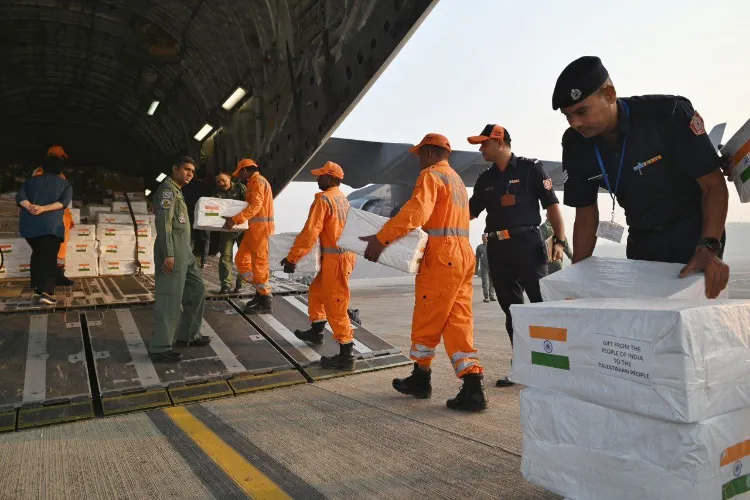.webp)
Aditi Bhaduri
The Hamas-Israel conflict is in its fourth week now and shows no signs of letting up. As is the peculiarity of this conflict, it attracts immense emotions across the globe with the people cheering for either side. India is no exception. Israel-Palestinian tensions always manage to evoke some kind of primordial passion amongst people thousands of miles away from the conflict zone and with no apparent emotional or religious connection to the place.
One of the casualties of such heightened passions inevitably is the truth. There is a massive disinformation campaign being waged cutting across divides and from across the world. One curious fallout is the campaign discrediting India. A singular narrative of India's shifting stance regarding the Palestinians is being peddled sometimes by influential media houses. Nothing could be further from the truth.
Ever since the Narendra Modi government came to power in 2014 there has been widespread speculation that India's stand on the Palestinian issue would dilute in favour of India's friendship with Israel. India was, is, and should be friends with Israel because it is a knowledge-driven technological powerhouse, whose advancement in science, agriculture, and water technologies is sought the world over and millions of Indians stand to benefit from this.
It’s true under the current government ties between India and Israel have increased exponentially. However, this partnership with Israel has not been the preserve of the BJP alone. One of the first to seek such a partnership was former CPI(M) leader and then chief minister of the left-ruled West Bengal - Jyoti Basu. He even visited Israel in his official capacity!

Prime Minister Benjamin Netanyahu and his wife with PM Narendra Modi in New Delhi
Equally, however, the Modi government has increased its outreach to the Palestinians.
Prime Minister first met Palestinian President Mahmoud Abbas in New York in 2015 on the sidelines of the 70th UN General Assembly. The first foreign secretary-level talks between India and Palestine took place under his watch. However, even before this, in 2014 India voted for a UN commission to probe into possible Israeli war crimes in Gaza during its military operations there. It desisted from voting on a resolution to welcome the report of the commission. However, this stemmed more from the government’s concerns about the role that Hamas has played in fomenting terror in Israel. It is noteworthy that Hamas has recently been designated as a terrorist group by Egypt – an Arab country.
This is the same dynamics in play this time around too. As news of the savage and despicable Hamas attacks on Israel by air, land, and sea on 7th October broke, the prime minister’s response was to express solidarity with Israel. Which country would feel itself safe under a prime minister who would not have found these attacks repugnant? Remember Mumbai 26/11? Consistent with this stand India recently abstained from a UN General Assembly resolution on Gaza because it had omitted mention of Hamas which has been at the roots of the current war in Gaza.
Simultaneously, India has called for a cessation of violence and a resumption of direct talks between Israelis and Palestinians to realize the two-state solution - Israel and Palestine existing side by side in peace. India has also dispatched humanitarian aid to Gaza which has been under Israeli bombardment for weeks now and this aid is not a one-off thing.
Since the Modi government took over, it may be fair to say that it has not only remained true to India's position on the Palestinian issue but has been proactive.
True, this has not precluded India's outreach to Israel, what the government has done is to de-hyphenate the two and pursue relations with each other on individual tracks, just as all other major powers in the world do. This position was most succinctly expressed by the late Pranab Mukherjee who became the first Indian President to visit both Israel and Palestine in 2016. In his address at the University of Jordan, Mukherjee spelled out India’s policy: “Like Jordan, India’s traditional support to the Palestinian cause remains steadfast and unwavering while we pursue strong relations with Israel. Our bilateral relations with Israel are independent of our relations with Palestine.”
In the following year, Modi became the first Indian Prime Minister to visit Israel and later also the first Indian Prime Minister to visit Ramallah. While commentators frequently stress on the first they forget the second.in Ramallah Modi was even honored with the "Grand Collar of the State of Palestine". After holding talks with Palestinian Authority President Mahmoud Abbas, Modi said India hoped to see an “independent Palestinian state living in an environment of peace”.

Humanitarian aid to Palestinians being loaded in an IAF plane at the Hindon air base
Modi's visit to the Palestinian Territories came barely a month after Israeli Prime Minister Benjamin Netanyahu paid his first-ever visit to New Delhi. But what was striking was that almost on the eve of the visit, on 21st December 2017, India voted in favour of the UN General Assembly (UNGA) resolution condemning the US for its decision to move its embassy to, and recognize, Jerusalem as the capital of Israel. According to the Oslo Accords, the final status of Jerusalem is to be negotiated at a later stage. So, this was a unilateral move.
More significantly, India under Modi has increased its aid to the Palestinians.
Palestine has been a major recipient of Indian aid since the 1990s. In 2016, India under the Modi government established an IT hub in Ramallah by providing a $12m grant. There have been numerous other such contributions, especially in healthcare. India’s greatest contribution, however, may be the increase in aid to the United Nations Relief and Works Agency for Palestine Refugees in the Near East (UNRWA), after the Donald Trump administration decided to stop all aid to it. India increased its annual contribution to the agency to $5 million. Do all of these measures testify to watering support of India's support to the Palestinian cause?
ALSO READ: Decoding the surprising Hamas assault on Israel
India is following the same policy that is followed by many other supporters of the Palestinian cause like the non-Western powers like China and Russia, and Arab countries like Egypt and the UAE. Surely India cannot be more Arab than the Arabs?
Aditi Bhaduri is a journalist and political analyst specialising on West and Central Asia.
